

Download. From FreeMind The latest stable release of FreeMind is 1.0.0.
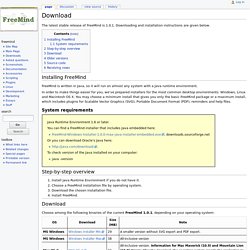
Downloading and installation instructions are given below. Installing FreeMind FreeMind is written in Java, so it will run on almost any system with a Java runtime environment. In order to make things easier for you, we've prepared installers for the most common desktop environments: Windows, Linux and Macintosh OS X. System requirements Step-by-step overview Install Java Runtime Environment if you do not have it.
Download Choose among the following binaries of the current FreeMind 1.0.1, depending on your operating system: For Linux, the installation procedure is described in length. Older versions You can also download older versions; see all files for download. Source code You can download source code by browsing all files for download, looking for the files containing the "-src-" substring. Receiving news To receive news on latest releases, consider subscribing to RSS feed for project file releases. The Seven Habits of Highly Effective People. The 7 Habits of Highly Effective People, first published in 1989, is a business and self-help book written by Stephen R.
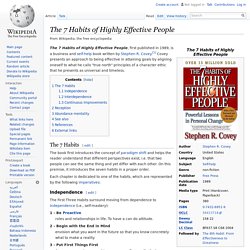
Covey.[1] Covey presents an approach to being effective in attaining goals by aligning oneself to what he calls "true north" principles of a character ethic that he presents as universal and timeless. The 7 Habits[edit] The book first introduces the concept of paradigm shift and helps the reader understand that different perspectives exist, i.e. that two people can see the same thing and yet differ with each other. On this premise, it introduces the seven habits in a proper order. Each chapter is dedicated to one of the habits, which are represented by the following imperatives: Independence[edit] The First Three Habits surround moving from dependence to independence (i.e., self-mastery): Desiderata. 1976 edition of The Desiderata of Happiness poetry collection "Desiderata" (Latin: "desired things") is a 1927 prose poem by American writer Max Ehrmann.
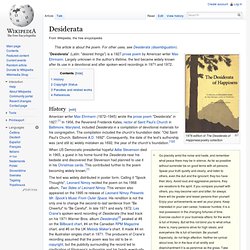
Largely unknown in the author's lifetime, the text became widely known after its use in a devotional and after spoken-word recordings in 1971 and 1972. History[edit] Go placidly amid the noise and haste, and remember what peace there may be in silence. As far as possible without surrender be on good terms with all persons. 12 Critical Things You Should Never Tolerate. There is so much in life that we just tolerate.

Some of it we have to deal with (taxes, bad weather, traffic). But there’s a good portion of stuff that we tolerate even when we don’t have to. We step around things, overlook irritations, and mindlessly accept energy drains. Perhaps we’ve become so immune to these tolerations that we don’t recognize the negative impact they have on us. Sometimes just recognizing the things we are tolerating in life gives us a renewed sense of hope and energy. However, when you address some of your bigger tolerations, you can completely change the course of your life and open doors to a world of happiness and inner peace that you didn’t know existed. Think about the poorest of the poor, living in squalor and despair without the hope of a better future. 60 Small Ways to Improve Your Life in the Next 100 Days. Contrary to popular belief, you don’t have to make drastic changes in order to notice an improvement in the quality of your life.

At the same time, you don’t need to wait a long time in order to see the measurable results that come from taking positive action. All you have to do is take small steps, and take them consistently, for a period of 100 days. The Art of Complex Problem Solving. 50 Questions That Will Free Your Mind. How To Live Life. What is something I can do today that will make me a better man by the time I go to bed tonight? : AskReddit.
Mind Maps. Mindmapping, concept mapping and information organisation software. Visual Understanding Environment. All software. List of concept- and mind-mapping software. Concept-mapping and mind-mapping software are used to create diagrams of relationships between concepts, ideas or other pieces of information.
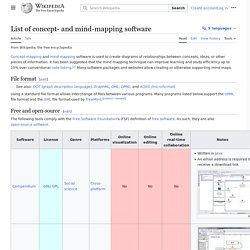
It has been suggested that the mind mapping technique can improve learning/study efficiency up to 15% over conventional note taking.[1] There are a number of software packages and websites that allow the creation of, or otherwise support mind maps. File format[edit] Using a standard file format allows interchange of files between various programs. Many of the programs listed below support the mm format used by FreeMind. The mm format is an XML text format consisting of tagged objects.
Free Software[edit] The following tools are free as defined by the Free Software Foundation. Freeware[edit] The following is a list of notable concept mapping and mind mapping applications which are freeware (they are available at no cost). Paid software[edit] The table below lists pieces of paid commercial software that allow the creation of mind maps and concept maps. Free mind mapping (and related types) software.
I see regular inquiries on Twitter and in forums from people looking for free software to support visual thinking.
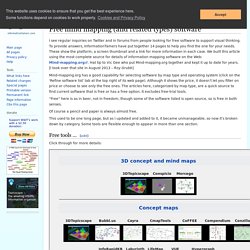
To provide answers, InformationTamers have put together 14 pages to help you find the one for your needs. Plans & Pricing. CU National Finder: Search Results. It All goes Back in the Box. Aldous Huxley, Doors of Perception excerpt. Eric Bibb~Wayfaring Stranger. Kensho.